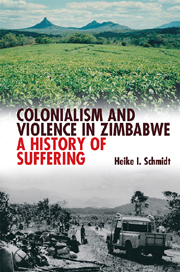4 - The Frontier Society under Threat
Politicisation & Militancy
Published online by Cambridge University Press: 05 May 2013
Summary
Rural grievances resulting from colonial policies and interventions have been a major theme in African Studies for some time and are well-documented in the case of Zimbabwe. Still, an approach that differentiates which state actions were tolerated from those that caused suffering, and for whom, and how such experiences affected the politisation of the rural population is pertinent. The previous chapter showed that colonial land alienation caused great suffering among the so-called ‘highveld Manyika’, while Chief Zindi and his followers endured the establishment of the tea plantations. This chapter traces politicisation from the mid-1950s, when the settler state began to fully show its presence in the Honde Valley, until 1974 and the arrival of young men with AK-47s, in this case Mozambique's liberation army FRELIMO, soon followed by Zimbabwe's ZANLA. What transpires is that no single model can explain the range of responses to state intervention, from accommodation to resistance, by the valley's inhabitants. In part, what applies is the observation Flame, a young female combatant in the Second Chimurenga and the main character of the film with the same title, makes: ‘You always have a choice!’ Still, three elements clearly emerge: Women and chiefs were at the forefront of protest; civic virtue was much debated in the 1950s and 1960s; and the presence of guerrilla fighters facilitated radicalisation.
- Type
- Chapter
- Information
- Colonialism and Violence in ZimbabweA History of Suffering, pp. 116 - 150Publisher: Boydell & BrewerPrint publication year: 2013



